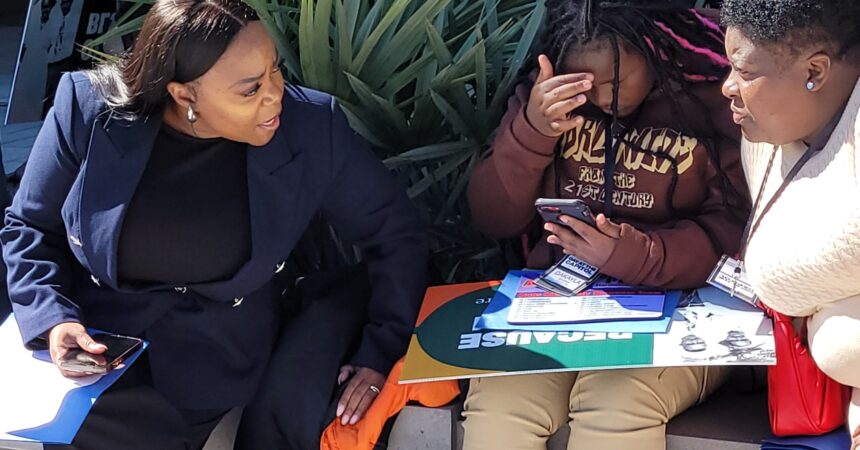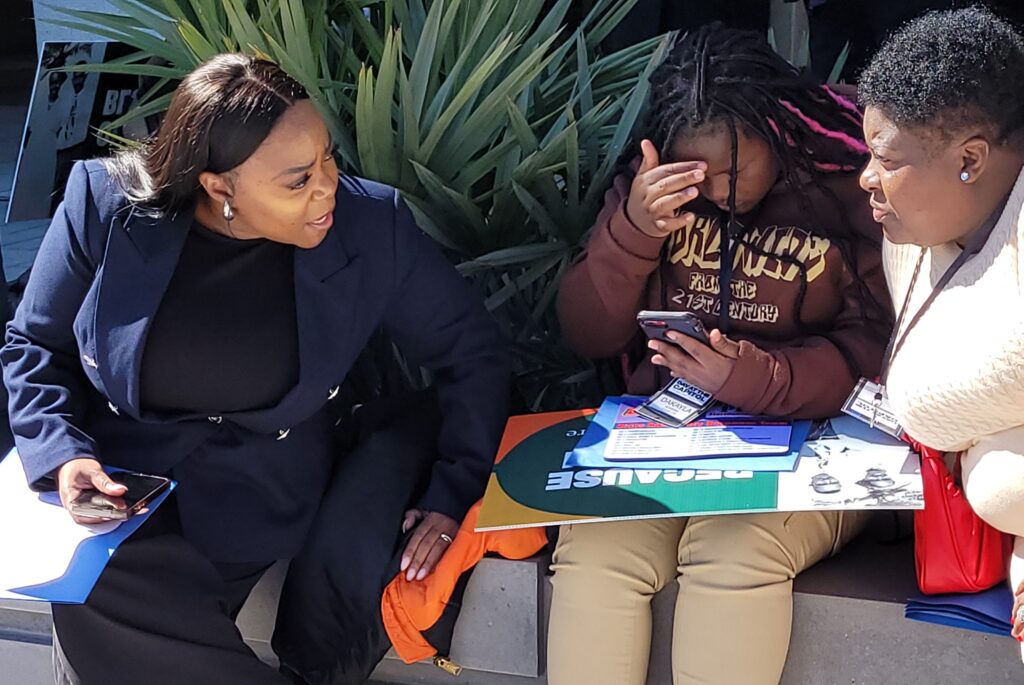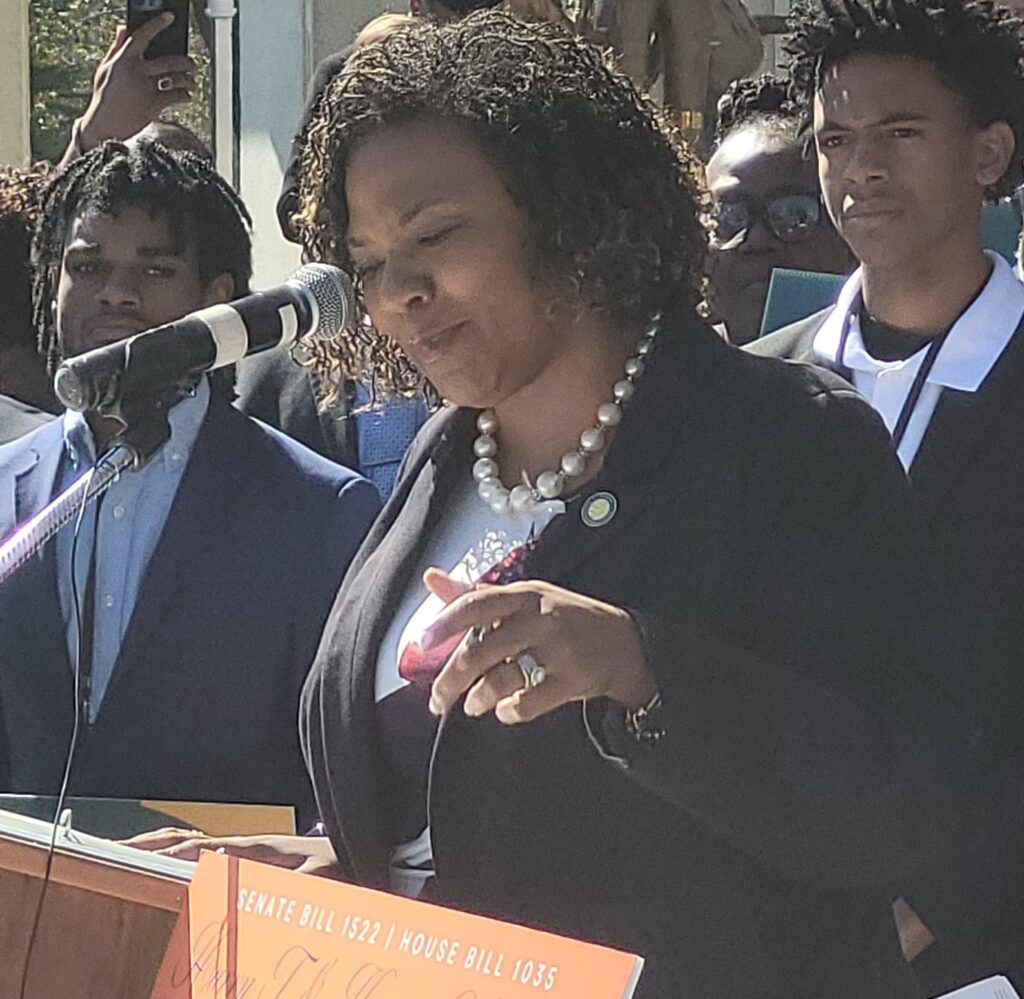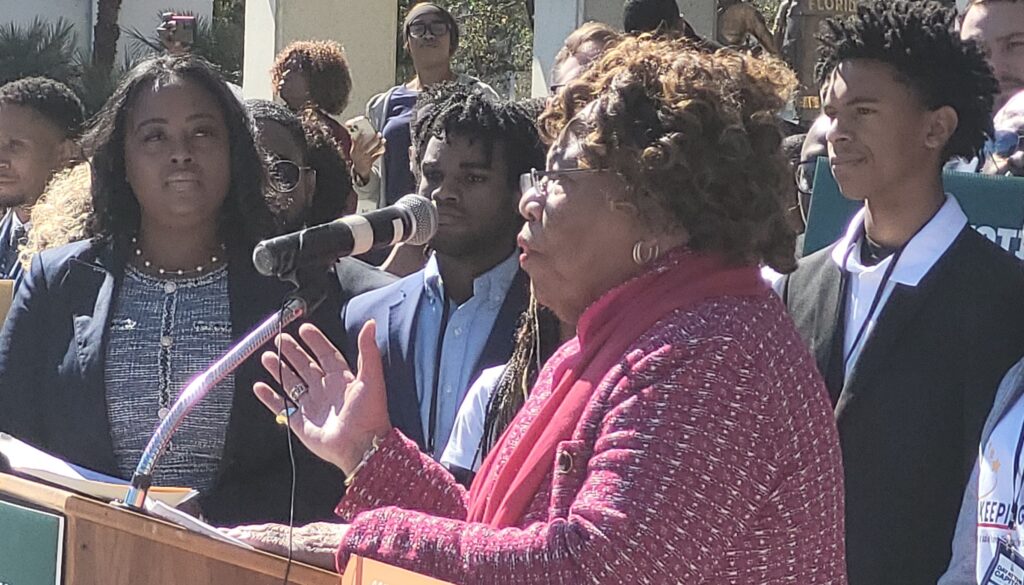
A fight to vote
Crowd shows up to support unrestrictive voting right act

Photo by St. Clair Murraine

Photo by St. Clair Murraine
By St. Clair Murraine
Outlook Staff Writer
If anyone wasn’t quite sure why a voting rights rally took place at the Capitol Sen. Geraldine Thompson had the answer.
“Voting is the fundamental basis of our democracy,” Thompson told the crowd gathered in the shadow of the House building.
Thompson was there along with Rep. Lavon Bracy-Davis to share details on a bill they introduced to restore voting rights taken way in 2021. The two lawmakers named the bill Harry T. and Harriette V. Moore Florida Voting Rights Act.
The Moore couple fought for Black voters in Florida and had registered more than 100,000 when they were killed. The Klu Klux Klan bombed their home in December 1951.

Photo by St. Clair Murraine
As of last Wednesday, the bill wasn’t on the Legislator agenda. It is the first known legitimate counter to a slew of changes that restrict early voting, voting by mail and laws that make it difficult for former felons to vote.
Bracy-Davis expressed optimism that the bill will make it through the current legislative session, saying that the entire Democratic caucus and some Republicans favor (SB 1522/HB 1035). She also said that public support for the bill was evident by the large turnout.
She used the story of a victim who was bullied until a family member stepped in. The more than 400 people who showed up represented that family member, taking the fight for restoration of voting rights to the Capitol, she said.
“We’ve decided that enough is enough and we are here to battle bullies,” Bracy-Davis said. “Have no fear because backup is here. We will not retreat.”
The bill is also being supported by the Southern Poverty Law Center, The NAACP, Equal Ground Action Fund, the ACLU of Florida, Florida Rising and other civil rights and voting rights organizations.
Many of the organizations brought supporters to the rally. More than 300 of them made up the three bus loads that came with the Equal Ground Fund.
Thompson called them “warriors” for showing up to support the proposed bill.
Throughout the afternoon, speakers made reference to the gutting of the Voting Rights Act, which the U.S. Supreme Court overhauled. The court’s decision in 2019 left it up to states to seek federal approval before implementing new voting laws. That gave clearance to Republican-led legislatures across the country to pass restrictive election laws.
“There are forces that want to turn the clock back,” Thompson said. “They want to turn the clock back on our voting right and you being here today is to send a message that the only clock you’re going to turn back is the one for daylight saving time.”
There was an obvious youth movement at the rally. Many of them traveled with the Equal Ground group.
Thompson took time to speak directly to the teenagers.
“We are here to let you know that we are fighting for your rights, for those young people yet not eligible to vote,” she said. “It is because of them that we are here.”
Afterward, Jasmine Burney Clark, founder of the Equal Ground Action Fund, elaborated on the importance of having the young people at the Capitol.
“It is incredibly important and intentional for us to have students join us on this trip to walk into the halls of the Capitol to see where the laws are being made,” she said. “They are the direct targets of the legislation coming out of this location.”
Burney Clark attributed the growing number of restrictive voting laws to fear among Republican legislators.
“Our voting behavior and preferences threaten their political party and their power and they have found ways to completely wipe us off of the roll,” she said. “We won’t stand for that.”
She estimated that after the 2022 election, 4.9 million were purged from Florida’s voting roll. About 460,000 of those are Black.
Those numbers included hundreds of former felons, who have been in limbo, despite overwhelming voter support that approved Amendment 4 to restore felons’ voting rights. Patricia Fleurinord, Impacted Voter, Florida Rising, calls Amendment 4 a “massive victory,” although felons have been disenfranchised by the passage of SB7066 in 2019.
The major sticking point in the bill is the requirement that felons pay all fine and fees associated with their sentence before they get their voting rights back. Fleurinord called for establishment of a database to help clear the muddle.
Fleurinord also appealed to felons to join the movement against restrictive voting laws.
“If you are a returning citizen and still cannot vote stay a part of the process,” she said. “Take your family and friends to vote. Make some phone calls, do some counseling because its time for us to show up for ourselves.”
Another challenge that returning citizens have to face is the Office of Election Crimes and Security. Gov. Ron DeSantis signed it into law, claiming that it would reduce the chances of election fraud.
One of the cases that grew out of the establishment of Office of Election Crimes and Security recently played out in Tallahassee when 69-year-old Marsha Ervin was charged with election crime. Attorney Mutaqee Akbar, president of the Tallahassee chapter of NAACP, and other rallied to Ervin’s support, leading to the charges being dropped.
Ervin’s case is proof of the effectiveness of organizing, Akbar said at the rally.
“Organize. Organize, bring communities together, have support (and) show your elected officials that you will hold them accountable,” he said. “But not just hold them accountable but that you will support them when they do the right thing.
“We must continue to fight and we must continue to win.”







